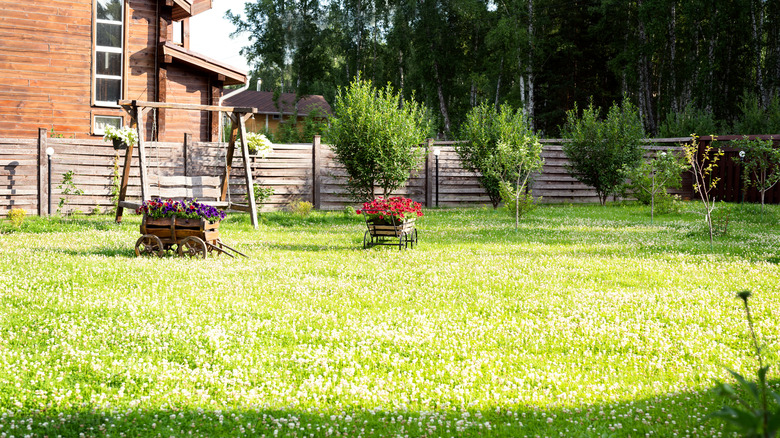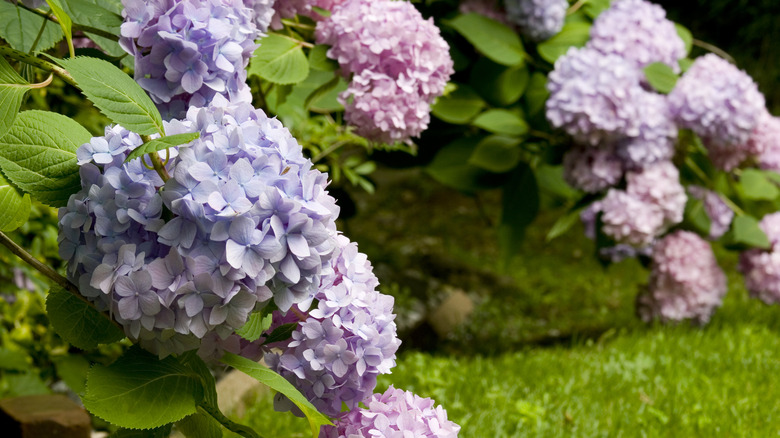Why You Should Think Twice Before Creating A Clover Lawn In Your Backyard
In recent years, clover lawns have gained popularity as eco-friendly alternatives to traditional grass lawns. Clover is drought-tolerant, requiring less water than typical grass, making it a sustainable choice. This is particularly advantageous for those living in dryer climates or communities that restrict lawn watering. Additionally, unlike traditional grass lawns, clover doesn't need as many chemical inputs to maintain its appearance, which contributes to a healthier environment overall. Another popular trait is clover's dense growing habit. This characteristic inhibits weed growth, reducing the need for herbicides. In this way, its inherent qualities yield fewer maintenance requirements. Beyond practical advantages, clover's lush greenery and charming white flowers create a visually appealing landscape. Nevertheless, there are still some drawbacks to consider regarding its looks and general harmony with your existing vegetation.
Planting a clover lawn may not be ideal for households with pets or outdoor enthusiasts. Clover, while resilient in many aspects, lacks the foot traffic tolerance of traditional grass. It can thin out and suffer damage in areas with frequent play or pet activity. The constant traffic may inhibit its ability to thrive, impacting the lushness of the lawn. Furthermore, the flowers and stems of clover can stain clothes, shoes, and even pet paws, leading to potential cleanliness concerns. For those who cherish a pristine appearance or have active pets, the potential for stains and wear could outweigh the benefits of a clover lawn.
Is a clover lawn the right aesthetic choice?
Those who appreciate the classic, manicured look of a traditional lawn may find that a clover lawn does not align with their aesthetic preferences. While some find the lush greenery and charming white flowers appealing, others view clover as less refined when compared to the uniform, neatly cut appearance of traditional grass lawns. The mix of clover leaves and flowers can give the lawn a more natural look, which may not suit everyone's taste. Additionally, for those living in communities with restrictions on yard appearances, it's best to check with the board before making the switch to a clover lawn.
Moreover, the winter browning or dying back of clover can be a drawback for those who desire year-round vibrancy in their lawns. While some grass varieties maintain their green color during winter, certain clover types may turn brown in colder months, affecting the overall visual appeal. In particularly winter-swept regions, clover may die back completely, revealing a muddy pit in the spring while it grows back from stems. Those who appreciate a full ground cover all year round may want to stick to traditional grass turfs despite their tendency to dull in color in the winter as well. Since clover dies back in the winter in cold regions, it may need to be reseeded to revive its lush, green appearance in the spring.
Challenges to your other plants
In addition to their ability to distort the established aesthetic of your yard, clover lawns can also disrupt the existing ecosystem. The nitrogen-fixing ability of clover, while beneficial for its own growth, can lead to imbalances in the soil for nearby plants. Excessive nitrogen fixation may create an environment favoring certain plants over others, potentially affecting the overall health and diversity of your yard's ecosystem. It's essential to consider the broader impact on surrounding vegetation when introducing nitrogen-fixing plants like clover.
Furthermore, clover has a preference for slightly acidic soils, and this may not align with the needs of other plants in your yard. If your existing plants thrive in a different pH range, the introduction of clover might create an environment where some plants struggle to survive. Hydrangeas, forsythias, and lilacs, for example, are all shrubs or bushes that thrive better in alkaline soil and may not be good neighbors for a clover lawn. Understanding the soil requirements of your entire yard's ecosystem is essential to maintaining a harmonious landscape.
Finally, some types of clover can be invasive, spreading rapidly and taking over a yard if left unchecked. This invasive behavior can outcompete other plants for resources. Homeowners should be cautious and choose clover varieties that are well-behaved to avoid unintentionally disrupting the delicate balance of their yard's ecosystem. While clover has several advantages, it's important to consider how it will affect other plants before introducing it to your outdoor space.


